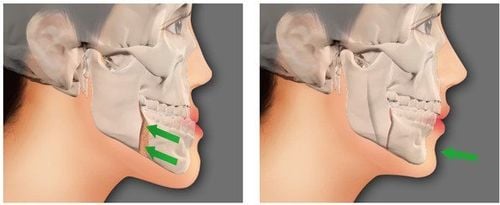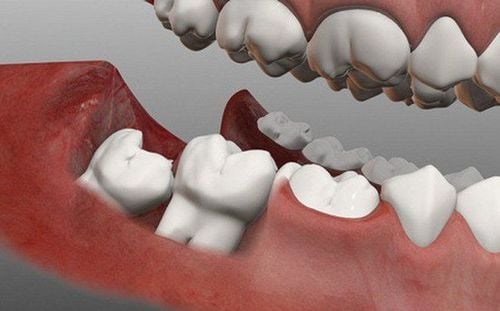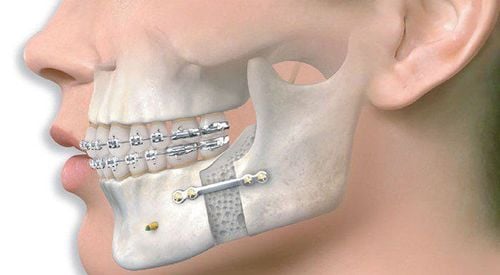This is an automatically translated article.
Whether wisdom teeth should be extracted depends on many factors. In case your wisdom teeth are affected, it is not possible to have adequate oral hygiene, it is best to have them removed. As for wisdom teeth that grow in an upright position, they do not need to be removed, as long as they are not painful and are not related to tooth decay or gum disease.
1. Should wisdom teeth be extracted?
Wisdom teeth grow behind the gums and are the last teeth to erupt. Most people have 4 wisdom teeth (1 in each corner). Wisdom teeth usually erupt through the gums between the ages of 18-25. By this time, 28 abnormal adult teeth have erupted, so there isn't always enough room in the mouth for wisdom teeth to erupt properly and can cause problems. Misaligned wisdom teeth can grow at many different angles in the arch and can even grow horizontally. Wisdom tooth problems can include:
Remaining completely hidden in the gums: If they cannot erupt normally, the wisdom teeth will become trapped inside your jaw. Sometimes this can lead to infection or can cause cysts that can damage other roots. Partially emerging through the gums: Because this area is difficult to see and clean, partially erupted wisdom teeth create passageways that can harbor bacteria that cause gum disease and mouth infections. Effects on neighboring teeth: If wisdom teeth don't have enough room to grow properly, they can crowd or damage neighboring teeth. Because of the lack of space, wisdom teeth can sometimes grow out of place or get stuck and only partially sprout. So should wisdom teeth be extracted? Some dentists recommend removing wisdom teeth if they have not fully erupted, it is better to have wisdom teeth removed at a younger age before the roots and bone are fully formed, this will help you recover. faster.
According to the American Dental Association, wisdom tooth removal is essential if you experience changes in the area of those teeth, such as:
Painful; Repeated infection of the soft tissue behind the lower last tooth; Fluid-filled sacs (cysts); Tumors; Damage to adjacent teeth; Gum disease (also called gingivitis or periodontal disease); Widespread tooth decay.
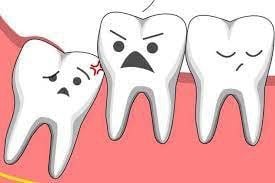
Có nên nhổ răng khôn không là thắc mắc của nhiều người
Do not remove wisdom teeth if they are impacted but do not cause any problems. Sometimes, wisdom teeth that are impacted or have not penetrated the gum surface can cause dental problems. Food and bacteria can get trapped around the edge of the wisdom tooth, causing plaque buildup, which can lead to:
Peritonitis - when plaque infects the soft tissue that surrounds the tooth; cellulitis - a bacterial infection of the cheeks, tongue, or throat; Abscess - collection of pus in the wisdom tooth or surrounding tissue due to a bacterial infection; Cysts and benign growths - it is very rare that an uncut wisdom tooth will develop into a cyst. Many of these problems are treated with antibiotics and antiseptic mouthwashes. Pain in the upper or lower jaw can often be the first sign that your wisdom teeth are causing problems. You may feel a feeling of pressure in the back of your mouth. In addition, the gum tissue around the growing wisdom tooth often becomes sensitive, swollen, and inflamed.
2. Does wisdom tooth extraction have any effect?
You should make an appointment with your dentist if your wisdom teeth are causing severe pain. They will examine the teeth and advise you if they need to be removed.
If your dentist thinks you may need to have your wisdom teeth removed, they will usually take an X-ray of your mouth. This helps the dentist have a clearer view of where the wisdom teeth are. For any wisdom tooth problem, it's important to see your dentist as soon as possible, rather than waiting for your turn for a routine dental check-up.
Removal of wisdom teeth will usually be recommended when other treatments have not worked. Your dentist can remove your wisdom teeth or refer you to a specialist surgeon for hospital treatment.
Before surgery, the procedure will usually be explained to you and you may be asked to sign a consent form.
Usually, you will be given a local anesthetic to numb the area around the tooth. You will feel some pressure just before the extraction, as your dentist or oral surgeon will need to widen the socket by swinging the tooth back and forth.
Sometimes it is necessary to cut a small piece on the gum and may have to cut the tooth into several smaller pieces before removing. It takes anywhere from a few minutes to 20 minutes or sometimes longer to have a wisdom tooth removed.
After wisdom tooth extraction, you may experience swelling and discomfort, both inside and outside of your mouth. Some mild bruising may also be visible. The condition usually gets worse in the first 3 days, but it can last up to 2 weeks.
As with all surgery, there are risks associated with the removal of a wisdom tooth. These include infection or slow healing, both of which are more likely to occur if you smoke during your recovery.
Another possible complication is "dry socket", a dull pain in the gums or jaw, sometimes with a bad smell or taste coming from the empty socket. Dry socket is more likely to occur if you do not follow the post-operative care instructions given by your dentist.
There is also a small risk of nerve damage, which can cause tingling or numbness in your tongue, lower lip, chin, teeth, and gums. This is usually temporary, but in rare cases it can be permanent.
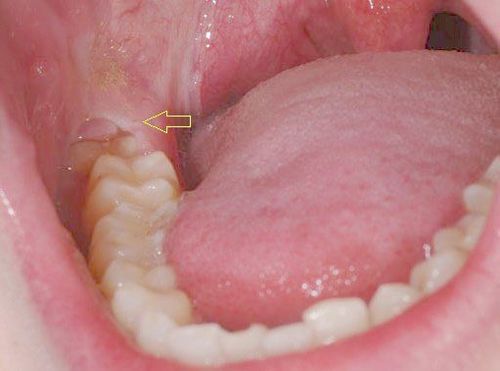
Sau khi nhổ răng khôn, bạn có thể sẽ bị sưng tấy và khó chịu
Mild to moderate pain is normal and can occur after tooth extraction, but other complications can also occur. Here is a summary of what you may experience after wisdom tooth extraction:
Pain: Some pain and swelling can occur with all extractions. In most cases, nonsteroidal anti-inflammatory drugs combined with a limited dose of anesthetic can help control most pain. Ice should be applied for the first 24 hours to minimize swelling. Dry socket: Although rare, it is one of the most common truly complications after surgery. It will usually happen 4-7 days after tooth extraction. Your dentist can treat it with an oral antiseptic solution or a specialized bandage, depending on the severity of the pain. Subbone Abscess: This is a pocket of pus that develops when bone and tissue debris becomes trapped between the healing extraction site and the tissue covering the bone. Your dentist can drain the abscess and give you antibiotics to help clear up any infectious elements. Bacterial infections: Postoperative bacterial infections are rare, occurring in less than 6% of cases. Your dentist may give you a dose of antibiotics before surgery to avoid infection problems. After surgery, it is sometimes necessary to rinse with an antiseptic or take additional antibiotics. In short, if your wisdom teeth are affected, it is not possible to have adequate oral hygiene, it is best to have them removed. As for wisdom teeth that grow in an upright position and have normal function, they do not need to be removed, as long as they are not painful and are not related to tooth decay or gum disease.
Please dial HOTLINE for more information or register for an appointment HERE. Download MyVinmec app to make appointments faster and to manage your bookings easily.
References: Mayoclinic.org, health.clevelandclinic.org, webmd.com, nhs.uk




